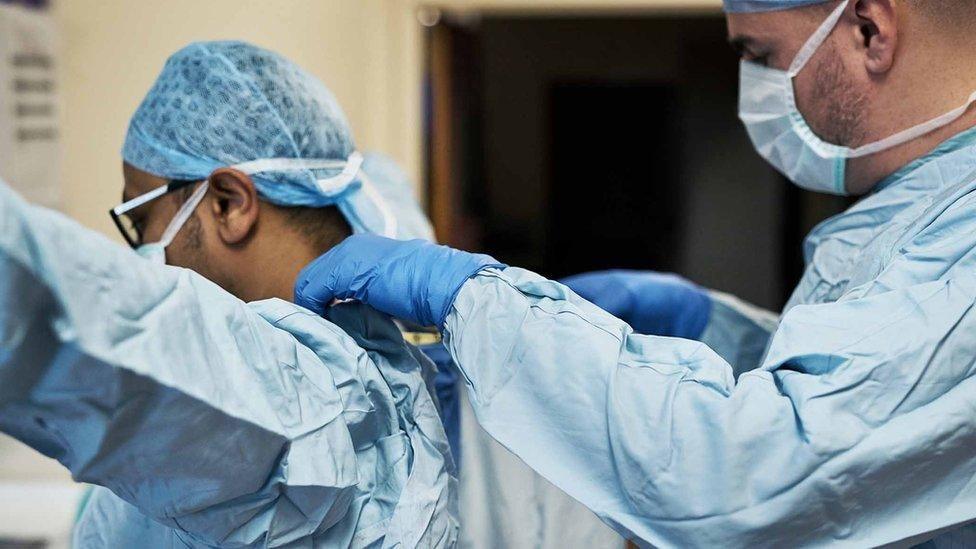Welsh hospital waiting lists hit record again

The Royal College of Surgeons warned that extra money for the NHS in Wales would not be an "overnight fix" for the waiting list backlog
- Published
Hospital waiting lists have continued to climb in Wales, rising for an eighth month in a row and setting a new record.
There were just over 801,300 patient pathways waiting for treatment, according to the latest figures from Digital Health and Care Wales.
However, the longest waits - the number waiting one and two years or more - fell over the month.
Health Secretary Jeremy Miles, who announced an extra £22m of funding earlier this week to tackle the backlog, said he hoped this "positive progress" would continue, but the Royal College of Surgeons warned more money did not mean an overnight fix to the backlog.
There was a slight improvement in ambulance response times. But A&E waiting times, outpatient and cancer treatment target times worsened over the month.
There were 23,701 waits of two years or more in September, which is 492 fewer than in August and follows five consecutive months of increases.
There are also 169,262 waiting a year or more, which is 440 fewer than the previous month.
But NHS England has been far ahead of Wales in tackling the longest waits after the Covid pandemic, with only 3.3% of all waits being a year or more, compared to 23.3% in Wales.
And only 113 patients are waiting more than two years in the whole of England.
The longest waits in recent months have been in ophthalmology, orthpaedics and ear, nose and throat specialisms.
Because some patients are on more than one waiting list, it is estimated 618,171 individuals are waiting - the equivalent of the populations of Cardiff and Swansea combined.
At the UK Covid inquiry on Wednesday, First Minister Eluned Morgan - who is also the former health minister - said capacity was an issue, and there were only 172 private hospital beds across Wales which could be called on.
Miles said a total funding package of £50m would help increase hospital capacity, including use of the private sector.
“We recognise the impact long waits for treatment can have on someone’s life, both mentally and physically, so we have a laser-like focus on reducing the longest waits and improving access to patient care," he said.
The Welsh Ambulance Service had its second busiest month on record for life-threatening emergency calls, with an average of 177 a day in October.
Figures show 50.4% of crews arrived within eight minutes to these "red" calls, an improvement on the previous month. The average response time was seven minutes 56 seconds.
Although the target is still not being met, the service is continuing to face the problem of thousands of hours spent outside A&E units waiting to handover patients.
Latest figures show about 22,000 "lost" hours waiting to handover patients at major emergency departments.
Other waiting time figures show:
There were 55% of cancer patients who started their treatment within 62 days of a tumour being suspected. This is lower than the previous month.
A&E waiting times against the four-hour target have worsened, with 68% waiting less than the target time.
When major A&E units are compared with England, Wales is performing comparatively worse for the eighth month in a row.
There were 10,159 waiting more than 12 hours in A&E, when the target is no-one should wait that long. The average wait remained two hours, 42 minutes.
There were reductions in long waits for diagnostics and therapies services and some reductions in the numbers of delayed discharge from hospital beds.
More people were waiting a year or more for a first outpatient appointment - a key post-pandemic target was to clear these long waits.
Plaid Cymru health spokesman Mabon ap Gwynfor called the position unsustainable, accusing the Welsh government of "continuing to throw money at the front line without dealing with the root cause".
He said Wales needed primary care and social care services which were properly funded and staffed.
The Conservatives said the waiting list figures meant Wales had reached "crisis point".
Health spokesman Sam Rowlands said even if Miles's expectations for his new initiatives were met, they would "barely scratch the surface in terms of tackling these excessive, record-breaking waits for treatment. Something needs to change, fast".
The Royal College of Surgeons said the figures made for "dismal reading" and called for a speeding up of the setting up of surgical hubs, for operations like hip and knee replacements and gall bladder removals.
Kate Seymour, of the Macmillan cancer charity, said the funding announcement was "another missed opportunity to set out specific plans to reduce cancer waiting times".
- Published24 October 2024
- Published20 November 2024

- Published19 November 2024
